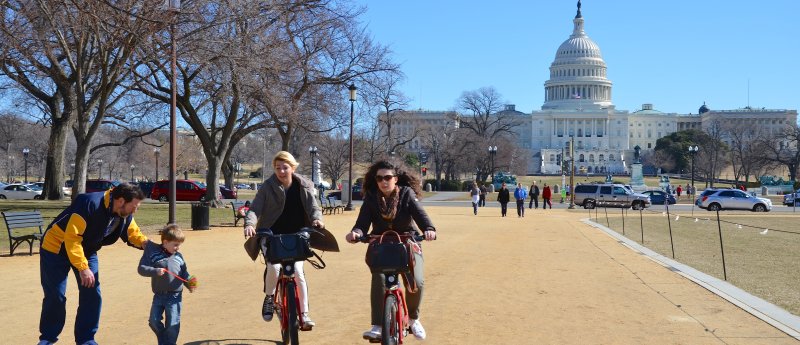Fostering Cross-Sector Collaboration to Improve Well-Being
Fostering Cross-Sector Collaboration encourages people to see the connection to health and well-being within their work, whether in education, transportation, community development, law enforcement, business, or other fields. Improving population health requires shared investments, mutually beneficial policies, and innovative partnerships that recognize the importance of well-being for all.
-
 Turning research into actionTurning research into action: A dialogue with decision-makers (PART TWO)
Turning research into actionTurning research into action: A dialogue with decision-makers (PART TWO)A few weeks ago, we sat down with a group of local decision-makers to find out how they think about and use research, and what facilitates or hampers acting on research to develop evidence-based policies. In part two of this series, we’ll share some of their advice for communicating and disseminating your work to non-researchers more effectively.
May 15, 2017
|P4A Spark
| -
 Nutrition and Physical ActivityFood pantries offer a unique opportunity to address community health
Nutrition and Physical ActivityFood pantries offer a unique opportunity to address community healthA randomized controlled research trial is studying how best to improve diabetes control in food-insecure populations.
May 2, 2017
|P4A Spark
| -

There are countless examples of how policies, laws, and guidelines can help people in our society live better and healthier lives. But there is still too much we don’t know.
February 7, 2017
|P4A Spark
| -

As Carson crafts his strategic goals for the agency, he should look to emerging cross-sector collaborations across the country to improve health outcomes through housing.
January 26, 2017
|P4A Spark
| -
Children and FamiliesHow Federally Assisted Housing Supports Adults and Families with Disabilities: A Study of Reasonable Accommodations and Services
Housing policy is disability policy, particularly for low-income households served by federal housing programs. People with disabilities are overrepresented in federally assisted rental housing, with 407 out of every 1,000 assisted households reporting a disability.
April 27, 2022
| -
The US is facing a housing affordability crisis that continues to exacerbate economic and racial inequities. Inclusionary zoning policies (IZ), which require real estate developers to include below market-rate units in new housing projects, and rent control regulations, which place caps on rental price increases, have reemerged as potential solutions to the housing affordability crisis. However, rent control and IZ policies are complicated and controversial. Studies generally find that rent control decreases rents for tenants in controlled units, but that these benefits may be offset by greater costs in the uncontrolled rental market. Likewise, while there is some evidence that IZ policies can provide economic opportunity for residents with low incomes, critics argue that they also reduce the overall supply of housing and serve as a short-term solution to the larger problem.
October 14, 2021
| -
Long before the novel coronavirus, poor and working-class communities of color across Florida were weathering a pandemic of multilayered oppressions. COVID-19 lays bare the systemic and structural inequities as pre-existing conditions for the most historically marginalized among us. And while housing is one of the most researched social determinants of health, effective policies have not been adopted to promote residential stability. Florida’s complicated political landscape has led to weak and fragmented tenants' rights protections and limited tools for affordable housing, which creates a structural vulnerability for the most underserved communities. In this project, the research team will study three Florida urban counties that have implemented COVID-related tenant protections in divergent ways (Miami-Dade, Orange, and Hillsborough counties).
January 27, 2021
| -
Within the last decade, debates on rent stabilization have reemerged among housing researchers, policymakers, and the communities they serve, especially in regions where low-income communities of color have experienced skyrocketing rents and disproportionate rates of residential displacement. As a whole, research on rent stabilization has produced mixed findings and limited empirical analysis to effectively guide policy decisions. This study seeks to address the uncertainty over rent stabilization’s effects by providing an evidence-based analysis of the early impacts of rent stabilization policies on tenants in the cities of Mountain View and Richmond, two jurisdictions in California’s San Francisco Bay Area that adopted rent stabilization ordinances in 2016.
January 27, 2021
| -
Early research suggests Middle Neighborhoods (MNs), communities that offer affordable housing that is not a result of specific affordable housing policy and access to many outlets that positively shape health and well-being, are opportunity-rich with place-based resources, and policy innovations at the city level hold the potential to increase this existing housing affordability and stability.
January 27, 2021
| -
Newly enacted Colorado HB1309, 1196, and 1201 require the Colorado Division of Housing to institute new regulations for manufactured housing parks and grants cities the authority to enact ordinances that support the safe and equitable operation of these communities. This project will evaluate the implementation process and impact of these policies in 3 different Colorado communities.
January 27, 2021
| -
Affirmatively Furthering Fair Housing (AFFH), enhancing federal efforts to hold local governments accountable in reducing segregation. The Trump administration rescinded this rule in early 2018, but eight states continue to implement AFFH programs. With recent legislation incorporating AFFH in its Housing Element Law, California now has perhaps the most expansive approach to AFFH in the country. All local governments in the state must update the Housing Element of their general plan over the next two years (2020-2022), a process through which they must plan to accommodate housing growth over an eight-year period and demonstrate to the state they have zoned an adequate number of sites for low-income housing.
January 14, 2021
| -
Numerous cities in the United States have passed "ban the box" policies that restrict the use of background checks in the housing application process. However, previous research has found that ban the box policies for employment applications increase discrimination against young Black and Latino men. In this project, the research team will examine the impact of background checks in the housing application process, asking two questions.
January 14, 2021
|